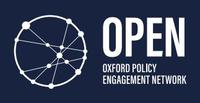Oxford Policy Engagement Network (OPEN) & The History Faculty - Historical expertise and the shaping and evaluating of foreign policy

How might we make better use of historical evidence and expertise in shaping and evaluating foreign policy? It is one of the questions that lie at the heart of my Oxford Policy Engagement Network (OPEN) Visiting Fellowship, hosted by the Faculty of History. The OPEN Visiting Fellowship is a new, University-wide initiative, intended as a learning and development opportunity for all involved. As policy professionals, Visiting Fellows have the chance to connect with researchers, and to explore shared interests and avenues for potential collaboration. Research professionals, in and outside host departments, learn more about the people and processes involved in making policy.
As one of the Visiting Fellows, I will be working with members of the Faculty to explore specific areas of research that align with my policy interests and build longer-term institutional relationships. It is another way in which government, in my case the Foreign, Commonwealth and Development Office, is engaging in the UK to connect with external expertise. It is also about building capability and thinking about the way we work in the civil service. This can support the best possible policy skills and productivity.

Foreign and Commonwealth office, London
I will be using the Fellowship to research and discuss current thinking on historical and contemporary geopolitical scenarios, and critically examine foreign policy decisions over time. It is an opportunity to test my thinking on the underlying dynamics or wider perspectives and implications for policy. My interests include the modern European experience of interaction with great power competition, drawing on lessons from history. I want to look closer at the current scholarship on spheres of influence, regional security architecture, multilateralism and other dynamics of international relations. It will be an opportunity to look at the long-term or emerging geopolitical dynamics including in the Indo-Pacific, Europe and the Arctic. I also want to look at research on technological, environmental and cultural change and its historical impact on foreign policy.
This is as much about the ‘how’ as the ‘what’. I hope to provide members of the Faculty with greater insight into policy-making and impact, including how government might engage externally on our priorities. The civil service is rightly considering how it reforms the way we work, responding to significant challenges in the world including the most contested geopolitical context for decades, and rapid technological change. This change is also an opportunity that is likely to be exponential in the coming years. I will be exchanging ideas on organisational improvement, the use of data, analysis and how we evidence and challenge assumptions to form policy options.
The Fellowship has already helped me to identify or recast how I look at issues relevant to areas of my work. For example, I have been able to engage with members of the Faculty, and others in the University, on the history of China’s approach to problem solving in public policy and planning; how research interests are evolving towards a later postcolonial era in South Asia; and research collaboration through international partnerships. For my part, I have been able to explain what we are doing in the Foreign Office to expand capabilities and language skills because of the increasing importance of India and China as global actors, and emerging areas of focus in government. Two recent entrants to the Foreign Office from undergraduate and postgraduate studies joined me to talk to current students about life in the civil service and how the students' skills can transfer into potential careers.
As well as history, the Fellowships provide an opportunity to explore interdisciplinary approaches in research, and consider new trends in other humanities and sciences that can inform the wider context for policy-making. Visiting Fellows from other fields of government are partnered with different University Departments. We will be coming together during the programme to compare experiences and ideas on what we have learned, and how we might apply them back in government.
It is a pleasure to be visiting Oxford again, many years after my undergraduate studies (Balliol 1994-7). What I learned then remains ever useful. History matters hugely in diplomacy, and I have found the skills of studying history an asset: an inquiring mind into what happened and why; and what people think and why. Knowing and respecting history was certainly important for my most recent posting in New Delhi. Engaging with students and academics there was also an enjoyable part of the job. That included our High Commission’s ’Young Thinkers’ series that started as a small seminar and rolled out to engage with thousands of young Indians at events in major cities across the country. Like other postings, I have fond memories of my time there, but this opportunity to engage with the Faculty in Oxford and be part of this initiative is an exciting and enjoyable benefit of being home in the UK.
Alex Pykett



